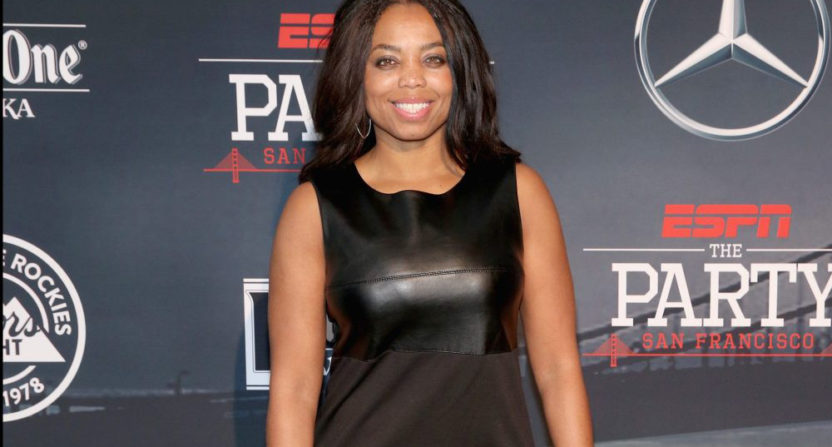ESPN public editor Jim Brady’s response to the company’s decision not to punish Jemele Hill for tweets about President Donald Trump drew plenty of criticism (as did his tweets doubling down on his position that Hill was wrong, and his firing of a writer at his other media venture who blasted him and his column). Brady has now weighed in on ESPN’s subsequent suspension of Hill for “social media policy violations,” apparently over tweets discussing the idea of a boycott of Dallas Cowboys’ sponsors in protest of owner Jerry Jones saying that players must stand for the anthem, and this time around, he’s much more critical of ESPN and more supportive of Hill. (On this issue, at least; he makes it clear later in the column he still disagrees with her tweets on Trump despite all the criticism he’s taken for his position.) In particular, Brady raises questions about the lack of clarity on why exactly ESPN suspended Hill this time, and if that’s indicative of larger business/journalism interference issues at the company:
When it comes to this latest action by ESPN, I am a bit perplexed.
Don’t get me wrong, I understand exactly what it is that upset ESPN about Hill’s actions: One of its highest-profile personalities suggested an advertiser boycott that would impact an important network partner, and she did so on Twitter, the same platform she used to call out Trump. And, make no mistake: Many of the NFL’s advertisers are also ESPN advertisers. Additionally, the calling for a boycott — or, at least, a strong encouragement of it — treads close to activism.
But it’s not the job of Hill — or any other ESPN journalist, for that matter — to concern herself with the network’s business relationships. In fact, the separation of “church and state” is a longstanding core concept in any news organization worth its salt. So it shouldn’t matter whether Hill’s comments put ESPN in a bad position with the NFL, any more than with the network’s excellent reporting on concussions that has done the same. I’m not suggesting that months long investigative reporting efforts and tweets are of equal importance; they’re not. But both should be treated the same when dealing with the impact on ESPN’s core business relationships.
ESPN has dozens of journalists who spend much of their time chasing stories that don’t reflect well on the network’s business partners, and the network has done a good job defending its journalists in those cases. That’s why the company’s reaction to Hill’s tweets should be worrisome to other journalists at the company.
…Hill’s Sunday tweets trod into a sandbox journalists aren’t supposed to worry about — the one that houses ESPN’s business relationships.
…Hill’s suspension seems to suggest that journalists should consider ESPN’s business relationships before speaking out, and that, in turn, does undermine the independence of journalists.
The latest
Of course, it goes without saying that plenty of strong journalism is done at ESPN, that they do often run reporting critical of their business partners (especially when it comes to the NFL and concussions), and that their on-air talent express negative opinions about leagues the network is in business with. There are numerous times where ESPN’s journalists and commentators appear to operate without much or any business-side interference. And Brady’s column points that out too, and also suggests that problems here could be from ESPN’s lack of transparency over their suspension of Hill rather than pure business interests; maybe they have a reason they aren’t revealing. And that’s possible; maybe there are journalistic reasons for this decision, and maybe it was made based on those then the more-obvious business reasons.
But Brady also quotes a recent memo about fundamental principles from ESPN president John Skipper that says “We are a journalistic organization and we should not do anything that undermines that position.” That’s a good position to have (even if it’s more in the context of what talent should and shouldn’t say), but what’s really undermining the journalistic credibility at the moment is the perception that ESPN makes some editorial, personnel and on-air decisions based on business interests and business partners, not journalistic principles. The Hill suspension is just the latest example of that, but it’s a highly prominent one, and one that has these business/journalism questions being discussed by the public editor. And moves like this call into question if ESPN’s behavior and policies will “undermine the independence of journalists,” and that’s potentially far more problematic for the company and its perception than anything its employees tweet.







